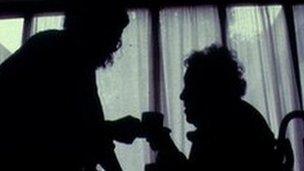Council care home beds: 600 lost in Wales in five years
- Published

Local authorities have been closing residential homes, preferring community-based care.
More than 600 council-run care home beds have been lost in Wales over the past five years, with forecasts that more will go.
Research by BBC Radio Cymru's Post Cyntaf programme shows one in five beds have been cut in the past five years.
Local councils are closing residential homes and opting for care in the community and private homes.
Age Cymru policy adviser Amy Clifton said it would mean more people being forced to pay for private care.
Mark Drakeford, chair of the Welsh assembly's Health and Social Care Committee, called it a long-term trend affecting the 23,000 people needing care.
Mr Drakeford said the fall had been going on for 10 years or more, and was expected to carry on into the next decade, but he added that "on the whole it's not necessarily bad news".
"Local authorities have invested money into creating services that allow people to stay at home for longer, where on the whole, we think people prefer to be."
'Careful steps'
He said local authorities had "diversified into other forms of residential care" and moved away from the traditional residential care home set-up.
"I think it is important to maintain a diversity within the residential care market. The fact the local authority may not have any homes under its direct control may not mean that there are not choices for people.
"There may be homes in the private sector and in the not-for-profit sector, as well, but it is important that every local authority takes careful steps to manage the market in their own area."
He said money was not the "key driver" behind the changes in social care, insisting people preferred to remain in their own homes.
"We have an ageing population so the age in which someone enters a residential care home is quite different to what it would have been half a century, a quarter of a century, ago," he added.
Ms Clifton said: "In general we believe that the existing arrangements for providing care in Wales are struggling under increasing pressure and a lack of resources.
"Under current funding arrangements a significant number of people are required to self-fund their care.
"Many residential homes routinely increase fees for self-funders and we believe it is extremely unfair that two people receiving exactly the same care in a residential home can be charged very different fees, with those in private arrangements effectively subsiding state-funded provision."
Wales' deputy older persons' commissioner Sarah Stone said: "I think what's really important is that we do have choice and diversity.
"Where provision is changing, residents and families have to have the support and advice that they need."
Ms Stone said there needed to be an "open and clear" debate on the issue.
'Alternative options'
"I cannot say never close a care home - we have to put their interests first.
"We need to have alternative options. People do want to remain in their homes but they need to have real choice over what happens to them. They need good quality care right across the board."
Ms Stone also called for a fairer system of care home funding, calling the current situation "confusing and complicated".
Mario Kreft, chairman of Care Forum Wales who runs Pendine Park Care Home in Wrexham, said: "The notion that you can somehow run a social and intergrated social service and health service without good quality local care home provision, quite frankly, is a fallacy.
"It is a trend we've seen for a number of years. I think it's fair to say there are other aspects councils are looking at, but I think the older persons' commissioner is absolutely right to be concerned because what we seem to have in Wales is a downward trend particularly in local communities."
Last month, it was revealed that all six council-run care homes on Anglesey may close in a bid to save £15m from the council's budget by 2016.
Social services for adults are being "remodelled" as the council deals with a rising elderly population, with estimates that by 2032 25% of the population will be over 65.
- Published23 August 2012
- Published16 July 2012
- Published27 October 2011
- Published5 October 2011
- Published28 June 2011